#accessible literature
Text
if the significance of the internet archive being threatened has been lost on anyone, maybe these quick comparisons will put it into perspective…
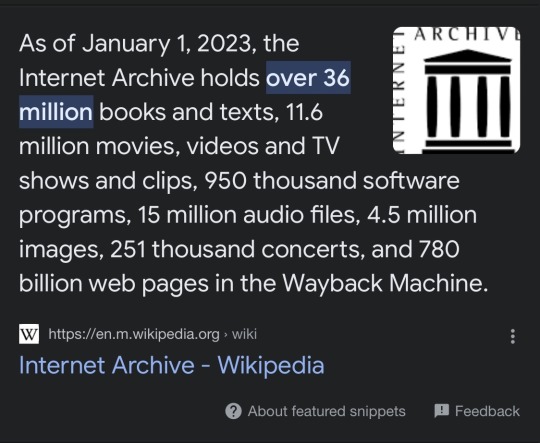
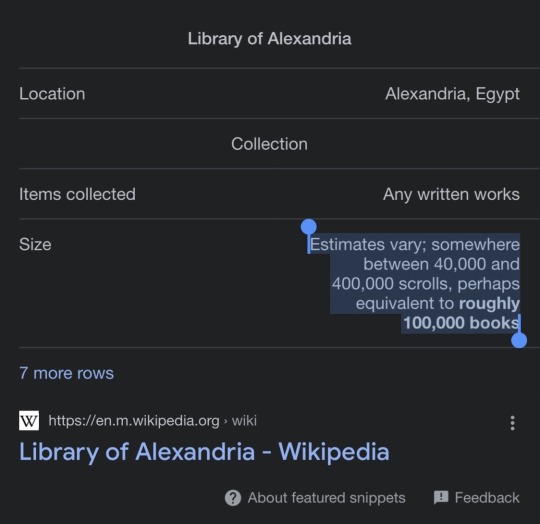
Banning the Internet Archive would be the equivalent of burning the Library of Alexandria hundreds of times…
[Image Descriptions in alt text]
#internet archive#hachette v. internet archive#save the internet archive#save internet archive#literature#dark academia#english literature#history#writing#reading#books#bookblr#book#library#libraries#save libraries#digital library#digital libraries#accessibility#library of alexandria#lit major#literature major#light academia#chaotic academia#academia#image described
6K notes
·
View notes
Text
Here’s a reminder that I have a website where you can read 15 obscure horror stories found in mid-1800’s literary magazines. I’m always searching for more, so check back periodically :D👍
#classic literature#horror literature#gothic literature#gothic lit#<- i wouldn’t count all the stories as gothic lit but i think the gothic lit crowd would like some of these#i also take requests so if you have a public domain short story you want made more accessible lemme know :)#ford speaks
407 notes
·
View notes
Note
Yo, I saw your post about orientalism in relation to the "hollywood middle-east" tiktok!
How can a rando and university dropout get into and learn more about? Any literature or other content to recommend?
Hi!! Wow, you have no idea how you just pressed a button. I'll unleash 5+ years on you. And I'll even add for you open-sourced works that you can access as much as I can!
1. Videos
I often find this is the best medium nowadays to learn anything! I'll share with you some of the best that deal with the topic in different frames
• This is a video of Edward Said talking about his book, Orientalism. Said is the Palestinian- American critic who first introduced the term Orientalism, and is the father of postcolonial studies as a critical literary theory. In this book, you’ll find an in-depth analysis of the concept and a deconstruction of western stereotypes. It’s very simple and he explains everything in a very easy manner.
• How Islam Saved Western Civilization. A more than brilliant lecture by Professor Roy Casagranda. This, in my opinion, is one of the best lectures that gives credit to this great civilization, and takes you on a journey to understand where did it all start from.
• What’s better than a well-researched, general overview Crash Course about Islam by John Green? This is not necessarily on orientalism but for people to know more about the fundamental basis of Islam and its pillars. I love the whole playlist that they have done about the religion, so definitely refer to it if you're looking to understand more about the historical background! Also, I can’t possibly mention this Crash Course series without mentioning ... ↓
• The Medieval Islamicate World. Arguably my favourite CC video of all times. Hank Green gives you a great thorough depiction of the Islamic civilization when it rose. He also discusses the scientific and literary advancements that happened in that age, which most people have no clue about! And honestly, just his excitement while explaining the astrolabe. These two truly enlightened so many people with the videos they've made. Thanks, @sizzlingsandwichperfection-blog
2. Documentaries
• This is an AMAZING documentary called Reel Bad Arabs: How Hollywood Villifies A People by the genius American media critic Jack Shaheen. He literally analysed more than 1000 movies and handpicked some to showcase the terribly false stereotypes in western depiction of Arab/Muslim cultures. It's the best way to go into the subject, because you'll find him analysing works you're familiar with like Aladdin and all sorts.
• Spain’s Islamic Legacy. I cannot let this opportunity go to waste since one of my main scopes is studying feminist Andalusian history. There are literal gems to be known about this period of time, when religious coexistence is documented to have actually existed. This documentary offers a needed break from eurocentric perspectives, a great bird-view of the Islamic civilization in Europe and its remaining legacy (that western history tries so hard to erase).
• When the Moors Ruled in Europe. This is one of the richest documentaries that covers most of the veiled history of Al-Andalus (Muslim Spain). Bettany Hughes discusses some of the prominent rulers, the brilliance of architecture in the Arab Muslim world, their originality and contributions to poetry and music, their innovative inventions and scientific development, and lastly, La Reconquista; the eventual fall and erasure of this grand civilization by western rulers.
3. Books
• Rethinking Orientalism by Reina Lewis. Lewis brilliantly breaks the prevailing stereotype of the “Harem”, yk, this stupid thought westerns projected about arab women being shut inside one room, not allowed to go anywhere from it, enslaved and without liberty, just left there for the sexual desires of the male figures, subjugated and silenced. It's a great read because it also takes the account of five different women living in the middle east.
• Nocturnal Poetics by Ferial Ghazoul. A great comparative text to understand the influence and outreach of The Thousand and One Nights. She applies a modern critical methodology to explore this classic literary masterpiece.
• The Question of Palestine by Edward Said. Since it's absolutely relevant, this is a great book if you're looking to understand more about the Palestinian situation and a great way to actually see the perspective of Palestinians themselves, not what we think they think.
• Arab-American Women's Writing and Performance by S.S. Sabry. One of my favourite feminist dealings with the idea of the orient and how western depictions demeaned arab women by objectifying them and degrading them to objects of sexual desire, like Scheherazade's characterization: how she was made into a sensual seducer, but not the literate, brilliantly smart woman of wisdom she was in the eastern retellings. The book also discusses the idea of identity and people who live on the hyphen (between two cultures), which is a very crucial aspect to understand arabs who are born/living in western countries.
• The Story of the Moors in Spain by Stanley Lane-Poole. This is a great book if you're trying to understand the influence of Islamic culture on Europe. It debunks this idea that Muslims are senseless, barbaric people who needed "civilizing" and instead showcases their brilliant civilization that was much advanced than any of Europe in the time Europe was labelled by the Dark Ages. (btw, did you know that arabic was the language of knowledge at that time? Because anyone who was looking to study advanced sciences, maths, philosophy, astronomy etc, had to know arabic because arabic-speaking countries were the center of knowledge and scientific advancements. Insane, right!)
• Convivencia and Medieval Spain. This is a collection of essays that delve further into the idea of “Convivencia”, which is what we call for religious coexistence. There's one essay in particular that's great called Were Women Part of Convivencia? which debunks all false western stereotypical images of women being less in Islamic belief. It also highlights how arab women have always been extremely cultured and literate. (They practiced medicine, studied their desired subjects, were writers of poetry and prose when women in Europe couldn't even keep their surnames when they married.)
4. Novels / Epistolaries
• Granada by Radwa Ashour. This is one of my favourite novels of all time, because Ashour brilliantly showcases Andalusian history and documents the injustices and massacres that happened to Muslims then. It covers the cultural erasure of Granada, and is also a story of human connection and beautiful family dynamics that utterly touches your soul.
• Dreams of Trespass by Fatema Mernissi. This is wonderful short read written in autobiographical form. It deconstructs the idea of the Harem in a postcolonial feminist lens of the French colonization of Morocco.
• Scheherazade Goes West by Mernissi. Mernissi brilliantly showcases the sexualisation of female figures by western depictions. It's very telling, really, and a very important reference to understand how the west often depicts middle-eastern women by boxing them into either the erotic, sensual beings or the oppressed, black-veiled beings. It helps you understand the actual real image of arab women out there (who are not just muslims btw; christian, jew, atheist, etc women do exist, and they do count).
• Letters of Lady Mary Wortley Montagu. This is a feminist travel epistolary of a British woman which covers the misconceptions that western people, (specifically male travelers) had recorded and transmitted about the religion, traditions and treatment of women in Constantinople, Turkey. It is also a very insightful sapphic text that explores her own engagement with women there, which debunks the idea that there are no queer people in the middle east.
---------------------
With all of these, you'll get an insight about the real arab / islamic world. Not the one of fanaticism and barbarity that is often mediated, but the actual one that is based on the fundamental essences of peace, love, and acceptance.
#orientalism#literature#arab#middle east#islam#feminism#book recommendations#reference#documentary#western stereotypes#eurocentrism#queer#queer studies#gender studies#women studies#cultural studies#history#christianity#judaism#books#regulusrules asks#regulusrules recs#If you need more recs#or can’t access certain references#feel free to message me and I’ll help you out!
76 notes
·
View notes
Text

Hard Reading: Learning from Science Fiction by Tom Shippley, an open access book on JSTOR!
The fifteen essays collected in Hard Reading argue that science fiction is a "high-information" genre that doesn't follow the Flaubertian ideal of le mot juste, "the right word," preferring le mot imprévisible, "the unpredictable word." The essays argue further that science fiction derives much of its energy from engagement with vital intellectual issues in the "soft sciences," especially history, anthropology, the study of different cultures, with a strong bearing on politics.
The autobiographical introductions in the book create between them a memoir of what it was like to be a committed fan from teenage years, and also an academic struggling to find a place at a time when a declared interest in science fiction and fantasy was the kiss of death for a career in the humanities.
272 notes
·
View notes
Text
z library got taken down because booktok blew it up, not realising it provided access to literature in third world countries where physical copies are expensive due to extra taxation and new releases are difficult to come by ???? like i'm glad booktok got more people to read but fuck you if you ever carelessly mentioned it or made a tiktok about it
#z library#rip baddie you will be missed#fuck booktok fr#all cos of the coho stans blowing it up too#congratulations you just took away free access to literature for less than mediocre literature
1K notes
·
View notes
Text

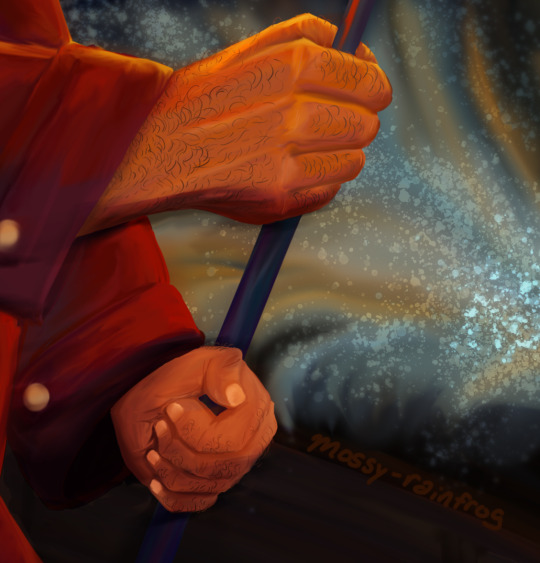
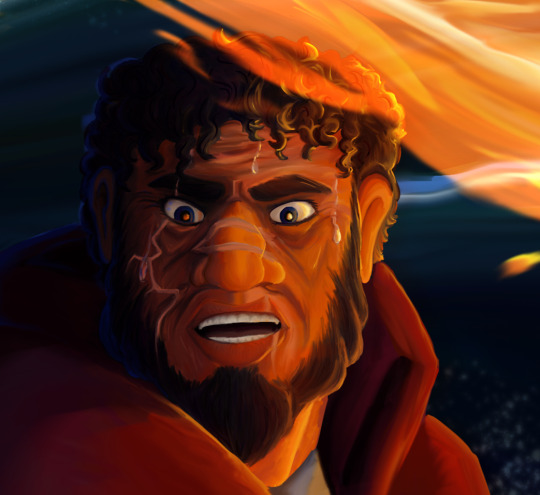
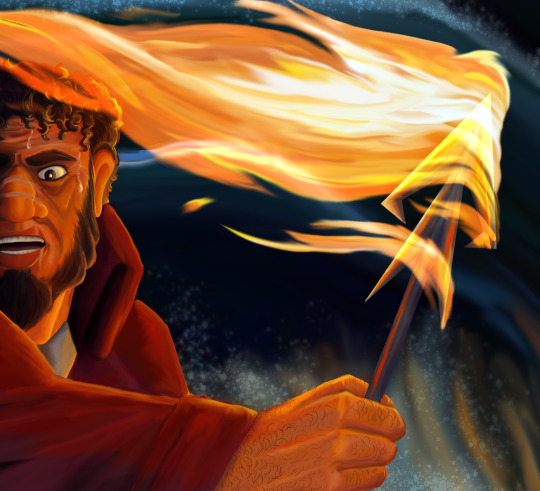
[ID: A digital painting of Captain Ahab from Moby Dick standing in a storm and wielding a burning harpoon. He stands near the railing of the ship as a wave breaks over the bulwarks, and scowls fiercely towards the viewer, mouth open as if in mid-speech, akin to a snarl. He holds the harpoon in both hands, and waves the burning barb of it in front of him. The light reflects off of his eyes, his face, and the droplets of water on his skin. Behind him, huge waves surround the ship. The next three images are closeups of the drawing: on his hands, his face, and the harpoon itself.
Character design: Ahab is an older chubby and muscular Persian man with short curly greying dark hair, a pointed beard, a lightning scar across his face, and a scar across his nose and lip. He wears a high-collared red coat over a light colored undershirt. End ID.]
"All your oaths to hunt the White Whale are as binding as mine; and heart, soul, and body, lungs and life, old Ahab is bound. And that ye may know to what tune this heart beats; look ye here; thus I blow out the last fear!" - Moby Dick: Chapter 119 ,The Candles
FINALLY finished this tribute to my favorite Ahab moment in the whole entire book. HOT MEN PUT DOWN A MUTINY SINGLEHANDEDLY WITH A BURNING HARPOON!!!! GAH!!!!!!!! special thanks to unsplash for all my color references, to my computer for putting up with this file, and @pocketsizedquasar for the most gorgeous and grand Ahab design of all time. Go read their webcomic.
#moby dick#mobydick#moby dick art#captain ahab#ahab#whale weekly#whale weekly spoilers#melville#herman melville#classic lit#classic literature#described#accessible art#mossy art#GAHHHH I'VE BEEN WORKING ON THIS FOR MONTHS AND I LOVE HIM SOOOOOOO MUCH. LOOK AT THAT MAN
134 notes
·
View notes
Text

ID: a tweet by Naomi (blanked out), @naomi_(blanked out)
“My boy is autistic and his drama group have adapted Twelfth Night to write a part for him where he runs on stage and interrupts the dialogue to reel off lists of facts about the play. Knowing loads of facts is his superpower. He loves his part.”
Honestly, I think the Bard would have approved.
(I hate the “x neurodivergence is a superpower” narrative, but anyone having an individual ability or fact about themselves they count as *their* superpower is different, as far as I’m concerned.)
#shakespeare#twelfth night#staging shakespeare#autistic young person#drama and literature are for all of us#accessibility#neurodivergence#autism#accommodations
143 notes
·
View notes
Text
I'm… mildly obsessed with the title of this paper I found, which I WILL be using for a research project.
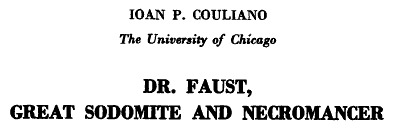
image description: screenshot of a title page with text in all capital letters
Ioan P. Couliano
The University of Chicago
Dr. Faust, Great Sodomite and Necromancer
#academics#literature#renaissance literature#marlowe#faustus#dr faust#dr faustus#sexuality#sodomy#necromancy#I absolutely cannot get over it and I fucking LOVE it#DR. FAUST - GREAT SODOMITE AND NECROMANCER#in all caps because it's that great of a title and the author was ready to own it#and I say kudos#ioan p couliano#my hero this semester#mxg shitpost tag#text post#no queue only post#ps if anybody reading this wants to get their hands on the actual paper and needs access just let me know#I will help
299 notes
·
View notes
Text
Now that I am mostly over the Absolutely Feral stage of my Radiant Emperor Obsession and can think again, I want to do a proper write up on how the series handles colonialism. I need to get my sources together and make it all pretty and stuff, but the gist of it is this.
I actually really respect SPC for not making it A Thing. Like, the colonialism is an inherent part of the serting, and a lot of important moments hinge around it, but there's also a pretty clear refusal by the author to turn it into A Statement. I think they do a really good job of walking the fine line between aknowledging it and making it clear that its an important part of the setting, without turning the book into a political thesis on Why Bad Actually.
I think a lot of fantasy authors that frankly have no business making their books into political science treatises try to be super philosophical about it, and inevitably have almost all their points ring flat bc the main character almost always ends up perpetuating the system they spent the whole book critiquing. The classic example being, of course, "We've destroyed The Evil Empire! We will now replace it with The Good Empire, which is functionally identical to The Evil Empire except Good bc our Main Character is in charge! This will totally change the systemic issues we've spent the last three million words exploring! How? Don't worry about it, absolute power only corrupts you if you're A Bad Person!" (atla. atla i am looking at you. my love for you does not mean I am letting you off the hook.)
The Radiant Emperor books interact with and aknowledge the colonialism. The empire canonically falls at least in part because of one guy's willfull ignorance of the differences between his culture and that of two of the people he loves the most, because his culture supercedes theirs to the point where he does not even consider the posibility of this difference truly existing as a real-life power imbalance. And still, these books are not about that! That is not the main theme! It is important. It is handled pretty well, it is aknowledged, and it is not The Point. I really appreciate that more understated approach that SPC takes, because ironically by refusing to partake in dramatic philosophical grandstanding the media often ends up making way better and more nuanced points, because then their point actually fits into the story they are trying to tell.
#white men really read three of the foundational texts of political science#none of which are from the last century and a half mind you#and immediately decide they're qualified to wax poetic about how politics should work actually#also white people really loooove writing about colonialism and imperialism while refusing to engage with any decolonial literature#you read The Prince and Hobbes' Leviathan huh. so did all polisci undergraduates. you are neither smart nor special<3#like seriously at least read some of W.E.B. Du Bois. its the most basic accessible uncontroversial decolonial literature out there#it wont kill u i promise <3 try venerating a black man even half as hard as u do basic white men it'll change your life for the better.#by making you more interesting at the very least#ok ok i got derrailed there#thank you SPC! I appreciate you! please write more!#i promise the actual write up will be. less ranty.#my thoughts#the radiant emperor
15 notes
·
View notes
Text
the local anime con is looking for people to write and host events.. what if i did a funny and sent in something abt bsd...... haha just kidding. unless? 😳
#.......20 likes and i will try#i actually started writing an essay abt bsd for fun but it doesn't really work if you're not deeply invested in it i think#i'm thinking smth more like how elements from the authors' lives and works are implemented beyond the namesakes#with an emphasis on the jpn ones bc this con focuses on japanese culture in general as well hehe#this way it's accessible even without knowing bsd and can convince ppl to check it out idk#idk if they'll accept smth that's abt just one anime but the literature aspect might help 🤔#it is a summer con so the s5 timing works nicely too.
99 notes
·
View notes
Text

yeah <3 (from Between Knights: Triangular Desire and Sir Palomides in Sir Thomas Malory's "The Book of Sir Tristram de Lyones")
#the real source of strength and of emotional support for men lies in the fellow feelings of other men#oh im sure#fork found in kitchen#this article is definitely worth reading if you have access to jstor btw#btw this is haha funny gay and all but also homosociality in arthuriana is a super interesting topic im sooo normal about it#arthuriana#arthurian literature#medieval literature#arthurian legend#thomas malory#fuck me i hate tagging#le morte d'arthur#sir tristram#sir tristan#sir palomides#palomides and tristram#isolde#tristan and iseult
9 notes
·
View notes
Text
conservatives are always saying “the liberals are getting out of hand these days! why can’t we go back to the time when everyone was normal?!” as if over two centuries ago circa. 1820 percy shelley wasn’t an outspoken polyamorous vegan anti-fascist chronically ill atheist spiritualist poet with weird hair and funky blouses and 10 mental illnesses buried in financial debt who lived in unofficial exile with his goth bisexual feminist wife who pioneered science fiction who ran around with him threatening old people by saying they wanted to decapitate the king
#he would have had blue hair if he had access to it#& neopronouns#probably#percy bysshe shelley#percy shelley#mary shelley#romanticism#romantic literature#english romanticism#english literature#literature#english academia#poetry#writing#writers#liberals#politics#lgbt#lgbt history#history#progressive
1K notes
·
View notes
Text
My nephew after a brief but nevertheless painful interaction with a jellyfish: *sobs* Let me back into the ocean so I can go find that jellyfish and stab a hole in him!
Me: NOOOOOOO!! 😱
#moby dick#herman melville#obsession#literature#classic literature#book characters#captain ahab#anecdote#so violent#access denied
9 notes
·
View notes
Text
The paywalls on academic literature make me want to kill people. What do you MEAN i have to pay you. What do you MEAN i don't have access through my university i am literally paying them thousands of dollars.
#'you have to do a literature review'#yeah well maybe the fucking university should give me access then you greedy fucks
14 notes
·
View notes
Quote
Blowing bubbles—that’s what I’m doing. They’ll explode and then I'll blow more and more, I guess—bubbles just as big and just as beautiful, until all the soap and water is used up.
F. Scott Fitzgerald, The Beautiful and Damned (1922)
#the beautiful and damned#f. scott fitzgerald#literature#sometimes i get angry at my parents for how hard they made it for me to access my trust fund#(my executor's name is marjorie and she is a very nice lady but still !!!!)#but then i remember what happened to gloria when she had access to unlimited funds#i have terrifying gloria potential within me#my parents did the right thing
280 notes
·
View notes
Text
One thing I think is cool about TLT is that it draws on so. fucking. many influences. It’s fun! There are so many angles! I’m always playing “spot the refrence”
But it also very much stands on its own, and it CAN be understood thematically and plot-wise, on its own. I’m always a bit wary of interpretations that are like “the book is telling us this but it actually means something else that can’t be inferred just from canon, because obviously you have to account for this reference and that other reference”
Nah. It’s a genuinely well-written book; the writing is solid. You don’t need tie-in material to understand it.
#i say this as a certified Nerd who Overthinks Canon#but i feel like 'you need a literature review before approaching space lesbians books speculation' kinda goes against#TM's whole writing raison d'etre#it's WILD and WEIRD but it's accessible
46 notes
·
View notes